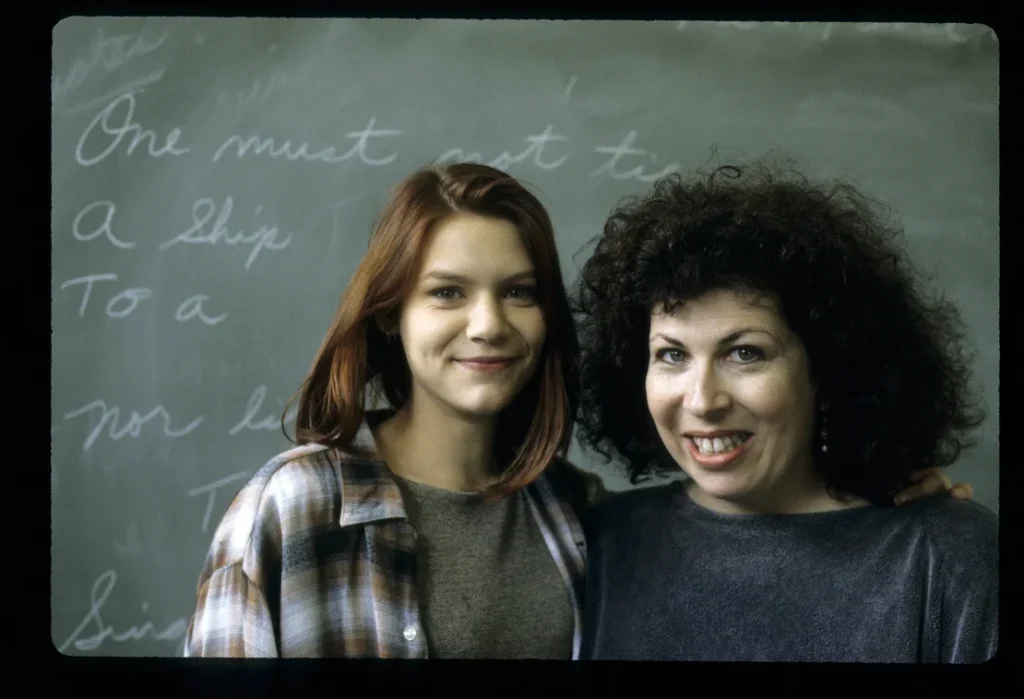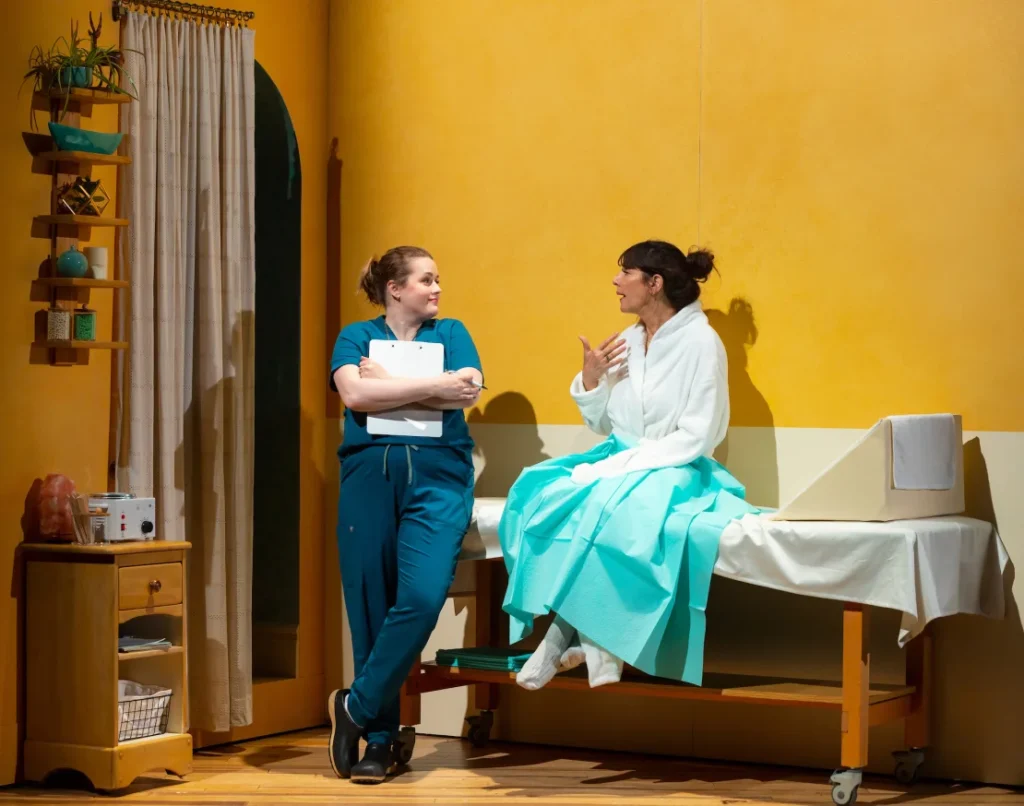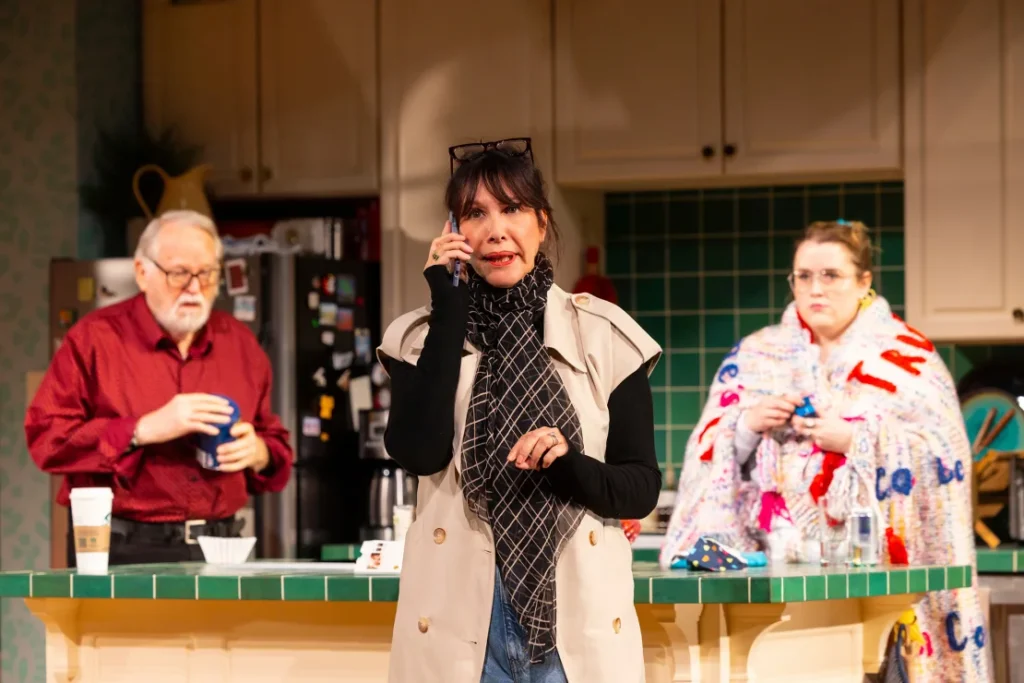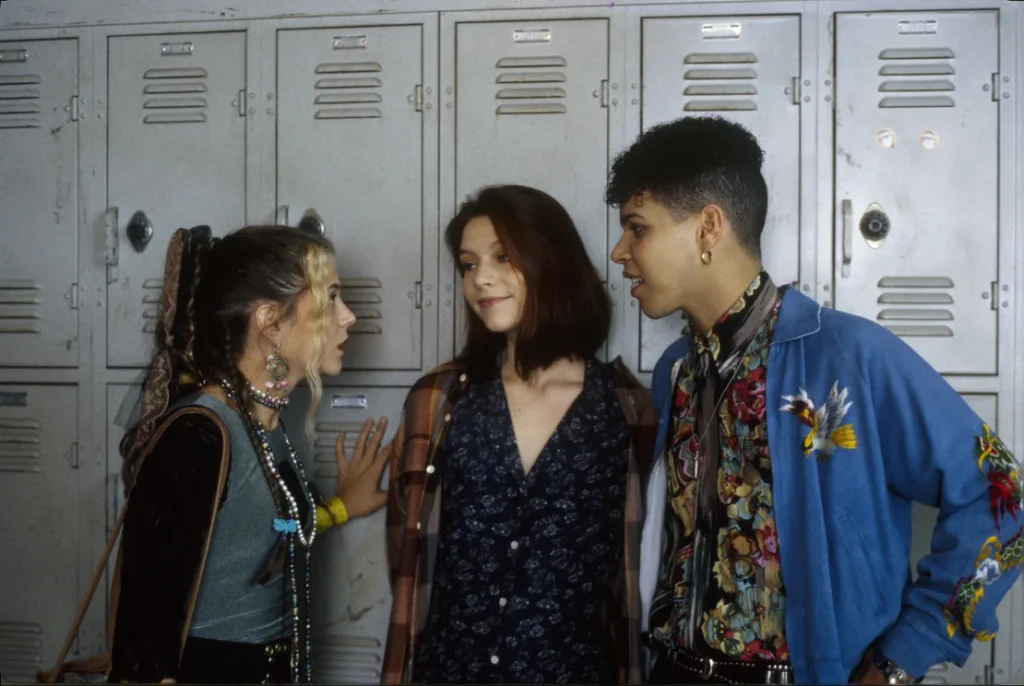
Who were we before our culture was defined by the internet? For many of us, that question is impossible to answer (you can pry our phones out of our cold dead fingers, thanks). And for others, the culture part was different pre-internet, perhaps better or more indelible, In The Before.
As an April essay for “Wired” put it, 1994 “might be the last calendar year not really captured online” — Netscape Navigator (reader, I used it) debuted in December of that year, with America Online hitting a million users the following year. The writer of that essay outlines what made that year in culture unforgettable, defined by music (Nine Inch Nails, Warren G, TLC, Tori Amos), movies (Clerks, Pulp Fiction) and loss (Kurt Cobain).
That year was also, in a very real way, defined by the words of television writer and playwright Winnie Holzman, the creator of “My So-Called Life,” which debuted 30 years ago this month, and its Gen X heroine, Angela Chase, portrayed by Claire Danes. Angela’s adolescent meditations on the cliches that fuel the adult world remain legend decades on. An example: “People always say you should be yourself, like yourself is this definite thing, like a toaster or something, like you can know what it is, even.”
In its single season, the show did more than launch the resplendent careers of Danes and Jared Leto, immortalized as her crush, Jordan Catalano. It showcased Holzman’s genius as a writer for cutting through the BS of everyday life to distill — in memorable and transformative ways — the most simultaneously fragile and powerful parts of human experience. Which is why, unlike some of the bands and films of 1994 (not to mention Netscape and AOL), the show has endured — it translates across the great before-and-afters that divide Generations X, Y and Z.
Holzman, who spoke with me by phone earlier this summer, recalled being on the picket line during the Writers Guild of America strike in 2023 and talking with “all these young writers.” Once in a while, she said, people would realize she was the creator of the show, and “they would come up to me and say, ‘You’re the reason I wanted to write for TV.’ And that really touched me, because that’s a beautiful feeling, that you inspire someone.”

It makes sense that the show’s timeless themes — friendship, identity, desire, hypocrisy, the pain and pleasure of growing up — would still resonate for people who are young enough to be the children of its original fans. But in addition to its Gen X bona fides, one aspect of the series that deserves more attention as a dimension of its appeal is its open and prescient treatment of sexuality.
Not only was it ahead of its time in its portrayal of queer adolescence, but its characters also expressed in frank terms the traps society laid for women and girls, especially when it comes to sex — confronting constraints that feel as real today as they did in 1994. Take an episode exploring the relationship between Angela and her estranged childhood friend, Sharon: “There’s this dividing line,” narrates Angela in a voice-over, “between girls who’ve had sex and girls who haven’t, and all of a sudden, we both realized that we were looking at each other across it.”
It’s difficult to talk about what life was like for girls who were and weren’t having sex in the 1990s without also talking about abortion. The America that sat down to the first season of “My So-Called Life” was two years on from Planned Parenthood v. Casey, the 1992 Supreme Court case which, decades before Dobbs v. Jackson Women’s Health Organization, observers feared (or hoped, depending on their politics) would overturn Roe v. Wade — but then, thanks to Justices David Souter, Sandra Day O’Connor and Anthony Kennedy, didn’t.
A few months before the show’s premiere, President Bill Clinton signed the Freedom of Access to Clinics Act, which made it a federal crime to obstruct the entrance to a clinic or intimidate clinic workers or women seeking abortions or reproductive health services. A few months after it, Newt Gingrich led a right-wing “Republican Revolution” in the 1994 midterm elections; he and his “Contract with America” took control of the US Congress, with Gingrich as Speaker of the House.
What does this history of a divided moment have to do with today? For women and girls living in America, it’s a reminder that our post-Dobbs reality wasn’t only made by then-President Donald Trump’s Supreme Court nominations in the 2010s. For lovers of “My So-Called Life,” it’s a reason to reflect, 30 years after this iconic show became a part of our lives, on how it continues to capture the spirit of people (of any age) struggling each day just to be who they are and be true to their choices.
And, for admirers of Holzman and her work, it’s a reason to consider the path her career has taken since then. She went on to become the co-creator, with Stephen Schwartz, of the hit musical “Wicked.” She also, between projects and while doing other things, wrote the play “Choice,” which ran at New Jersey’s McCarter Theatre earlier this year. A previous version was first presented at Boston’s Huntington Theatre Company in 2015, and Holzman told me she’s hopeful for future productions.
True to its name, the play addresses reproductive rights, following journalist Zipporah “Zippy” Zunder (played at McCarter by Ilana Levine) as she struggles with an investigative story about a noted film producer who believes that the souls of aborted fetuses are re-incarnated into children who are born months later. Zippy’s reporting assignment prompts her to revisit her own decision to have an abortion early in her career; “That abortion was the birth of my life as I know it,” she says.
The play is set pre-Dobbs, during the last year of the Trump administration, against the backdrop of the Covid pandemic and its disruptions to daily life. It shows a fascinating interplay between Zippy’s increasingly complicated feelings about choice and their effects on her relationships with her best friend Erica (Kate A. Mulligan), her daughter (Caitlin Kinnunen), her husband (Dakin Matthews) and research assistant (Jake Cannavale).
Holtzman and I spoke about her experience creating “Choice,” a project she first began in the early 2000s. “I would do other projects and then I would keep coming back to it. I never did lose the feeling that somehow it mattered to me to do this.”
This interview has been edited and condensed for clarity.
BC:So much of your work as a writer has opened up windows for audiences into the lives of women and girls. Was that part of what prompted you to write “Choice”?
Winnie Holzman: I thought the subject of abortion would be a really good one for a play. It has so much depth and complexity in our culture and in our society, it has become so polarizing. I thought to myself that perhaps a better way to talk about it would be in a play, rather than let’s say, on a panel, or on TV. I wanted to explore my own thoughts and feelings about the subject.
It’s been quite a process. Over the years, I would do other things, other projects, and then come back to it. And every time I came back to it, I felt like I had so much more insight and perspective. And when Sarah (Rasmussen, artistic director of McCarter Theatre) became interested in it and said, “I would really like to actually direct it and I’d actually like it to happen up at McCarter,” that was this incredible invitation to me to go back yet again and rethink the whole play, to rethink it through the prism of what had been happening with the fall of Roe and with the Covid experience, with the pandemic.
Obviously, those things are tragic things that I wish hadn’t happened. However, they felt like they belonged in the play, so I updated the play to reflect all of these aspects.
BC:You mentioned that you had staged it before. I’m curious if anything has stood out to you as different then, or this time around?
Holzman: That was in 2015, so a different time in our country. I think in certain key ways, what’s happened for us as Americans, has really impacted how people received the play. And it just seems like people are having a more emotional response to it. People seem more affected by it. They seem more open and responsive.
The play isn’t just about a woman’s right to choose. It’s about different ways that choices impact our lives and impact our futures, and it’s about how we connect to each other and what it means when a certain person comes into your life. The mystery of why a certain person might come into your life. So it’s not like, oh, it’s this play just about abortion. It takes the idea of a woman’s right to choose as a jumping off place.
I read in an interview that you described the play as distinctly pro-choice, but not polemical.
Holzman: Yes, from the very beginning, back in 2005 when I first started writing it, that was my goal.
BC: Reading that description made me wonder what you would say about the play specifically to audience members — who might find themselves seated next to one another — who disagree politically or spiritually or morally about abortion. How do you hope they would receive it?
Holzman: First of all, I would hope that people would feel free to have their own reactions, whatever they are. I did hope that the play might inspire conversation between people. I know that when I go to a play, that’s a such a great feeling, when you feel like you want to reach out, to the person sitting next to you, and hear what someone else is thinking and feeling about it.
So I did want, if possible, to create an experience that people might want to talk about or think about it afterwards. I’m not trying to tell people what to think. Quite the opposite.
I just wanted people to have an experience that might help them to feel something. That’s what I’m most interested in, to help people to feel less alone perhaps, or help people to just feel, in general, because there’s so much that kind of numbs us out.
BC: There’s power in that, to create an opportunity and a space for people to sit in the same place and think about what they believe without being told.
Holzman: That reminds me of one of the moments in the play that I added recently. It actually came out of a conversation I had with my daughter, who’s a wonderful writer in her own right. It’s this moment where the young woman in the waxing salon, the young esthetician, says that she doesn’t believe in abortion. And it felt really right to me to have somebody on that stage say that.
I was grateful to my daughter, who had said, “I think you should explore how that character feels about abortion.” And when I did explore it, I came up with the realization that it would be really interesting to have that person not believe in abortion for herself.

Of course, to say that you don’t believe in abortion is not the same as saying that you think it should be illegal and that people should go to jail for doing it. Those are two different things, not always differentiated in our public conversation.
But there are plenty of people who would never want to do it themselves, but who also I think, don’t feel that it’s right for them to judge another. Maybe. Look, I don’t know more about this subject than other people. I wrote this play, not as an expert on reproductive rights — as a person, a woman, living in America, who feels impacted by this difficulty we’re having about this subject.
BC: Has doing this play, especially post-Dobbs, had any effect on how you see the role of art in public discourse, especially in such a politically polarized environment?
Holzman: I feel like we need our theater experiences. We do, because they are community experiences. And we’re so polarized; we’re so on our own little phones. When you come into a space and you can experience something together and laugh together and possibly even get choked up together, it is bonding. And that can be a little bit healing … to gather together, laugh together, experience a story together. Those are basic things that help us feel less alone.
BC: In addition to being a play about abortion — and choices more broadly, “Choice” is a show with humor. Can you say a bit about that?
Holzman: It’s a serious subject, but I definitely and on purpose approached it with plenty of humor and I hope, compassion. I wanted the humor to be something that people could relax with and not feel like they were being, as I said before, preached to or lectured at, and I think I achieved that.
BC: You’ve spoken about your own abortion and how many parts of your creative life wouldn’t exist if you hadn’t made that choice for yourself. Can I ask why it’s important to you to be open about that?
Holzman: Well, the journalist who interviewed me happened to be someone I’ve known since I was 13 years old. I just want to be clear that I’m giving context. I felt very comfortable, talking with her and it felt good to just say it.
Because my truth is that if not for the legal safe abortion that I had in my mid-20s, there is no way I could have had the life I’ve lived. There is no way I would’ve gone to grad school in musical theater, which is how my whole writing life opened up.
There’s no way I would’ve been able to have the career that I’ve had without that abortion. And I wouldn’t have been married to my husband 40 years this fall, a person who always supported my dreams and really believed in me.
I am so grateful for the life I was able to live, for the blessings in my life that came to me because of being able to choose not to continue a pregnancy. Really grateful. For the blessing of having a choice.
BC: I’m going to pick up on your use of the word blessing as a way into asking about how the play doesn’t shy away at all from talking about deeply spiritual questions and the notion of souls. And that felt like a radical choice to me. Can you say more about the nature of the play’s connection to souls and spirituality?
Holzman: That just seemed natural to me (to include). It’s something I think about, something I feel strongly in my own life.
I love that you used the word “radical,” because I actually did feel that way from the very beginning. Could I attempt to write something where I let myself be open about my own feeling of connection to spirit, while at the same time exploring the whole idea and not being, like I said before, polemical or dictatorial or preaching?
I have this line that I gave to the daughter toward the very end, where she says, “I’m just sick of all the small-minded, cold-hearted people hogging God.” And I guess I feel that way. Why shouldn’t I be allowed to express my own perspective about God, spirit, and souls? So I gave myself permission.
You really hit on something that most people don’t ask me about. That’s one of the driving forces that led me to write this play. I was trying to express something that felt really true for me and express it in a way that had a mystery to it.

BC: I wanted to shift to the characters in “Choice” for a minute if I could, and to ask you, of all of the layers to your protagonist Zippy, what is most significant to you about all of the attributes that describe her? A journalist, a mother, a wife, a friend, and a woman who has had an abortion?
Holzman: Well, I think she’s facing a time of change in her life. I mean, we’re always facing change, and our lives are made up of change. The molecules of our life are change. Change is constant. But there are times in our lives when we become more aware that something’s shifting, that something’s different, that we’re facing a new kind of unknown. And I think that’s where she is in her life.
And I think through the course of the play, she becomes conscious of that. It takes her the whole play to come to terms with the fact that this is a new stage of her life. We’re not the same people all through our lives. Our lives are living, breathing things that evolve. She’s saying goodbye to some things in her life and greeting new things. And that can be scary.
After finishing this recent draft, I thought she’s a grown-up Alice in Wonderland. She’s still herself, but she’s learning things that she never let herself think about before, that she never knew were possible.
BC: It was really striking to me too, how much attention and focus the play puts on the relationship between Zippy and Erica.
Holzman: The heart of the play is those two women, and they’re having two very different responses to this situation.
I think we’ve all had those friends. This friendship where you really admire the other person, and you almost think of them as above you. Like, she’s more beautiful, more together, more well-read. That kind of friend.
That’s how I think how Zippy feels about Erica. And interestingly, I think Erica admires Zippy just as much, and is, in some ways, in awe of her. That seemed like an interesting dynamic to me.
They’ve known each other for so long, yet they come to realize that, in some ways, they don’t really know each other that well. They know who they used to be. But — who are they now? And, in the end, there’s this mystery: What could our friendship evolve into?
One of the things that was different (in an earlier staging of the play) was that when Erica left, she said, “I just can’t envision a future,” and that was the end of their friendship.
But I saw it differently this time around. Partly because of Covid and partly the because of the fall of Roe. I didn’t want them to completely let go of each other. But I wanted them to acknowledge that the friendship as they knew it had ended. And therefore … something new could take its place. Something new could be born.

BC: I have to ask about “My So-Called Life.” What’s the best thing a fan of the show has ever told you about watching it?
Holzman: Well, it’s really hard to pick one thing. People have said some amazing things to me. I do have a memory of a young man coming up to me and saying, “I used to watch the show with my mother and that’s how I was able to come out to her.” (In one of the show’s episodes, actor Wilson Cruz became the first out gay actor to portray a queer character in network TV when his character Rickie said to a friend, “Yeah, I’m gay.”)
Actually, I’ve heard that same story from more than one person. Which has really touched me, of course.
BC: My last question is about “Wicked.” The trailer for the film dropped earlier this year. What are you most excited about when it comes to seeing this musical phenomenon take on a new life when it hits the screen in November?
Holzman: It’s been a continuing, amazing surprise, how deeply certain people feel about the show. Just knowing that we can give them this new iteration of the story, with these incredibly thrilling young women at the center—these two young women (Cynthia Erivo and Ariana Grande) are truly amazing.
They’re beautiful and brilliant, and were directed by Jon Chu, who just has such a fresh, young, incredibly cinematic take on the story. I’m very happy that we can give that to our fans, and also that people who can’t go to Broadway or can’t go to theater for whatever reason, will have the chance to experience it.

